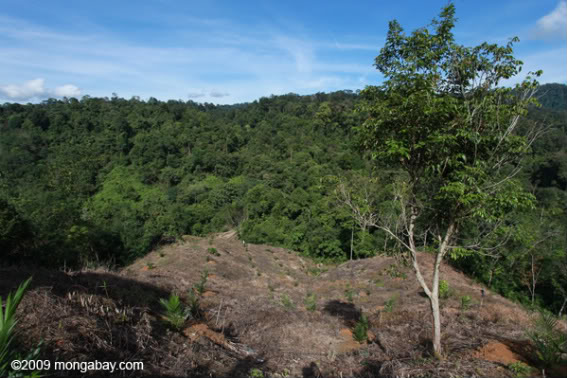The fashion world has been rocked: not by the newest designer or the most shocking outfit, but by the continuing destruction of forests in Indonesia. On September 15th, the Rainforest Action Network (RAN) helped open New York City’s styling Fashion Week with a party to encourage fashion designers to take a closer look at the paper bags they give customers.
Many luxury shopping bags are destroying forests as far away as Indonesia, impacting the world’s climate and threatening orangutans, Asian elephants, tigers, the Sumatran rhino, and innumerable other less well-known species, according to RAN.
The organization decided the best way to reach out to the fashion world was to throw a party and it appears to have worked. RAN says that several companies have cancelled contracts with Asia Pulp and Paper through New Hampshire based company, Pak 2000, including H&M, Billabong, Baker & Taylor, Osborn & Little, and OKA.
 Activist and model Summer Rayne Oakes speaks at RAN’s opening night party for Fashion Week. Photo courtesy of RAN. |
APP has long been accused by environmentalists of massive and unsustainable forest destruction in Indonesia, including clearcutting wildlife habitat, contributing to global warming, and destroying indigenous peoples’ land.
The party was hosted by fashion standby Tiffany’s and Co. The company was the first to make the switch in its paper bags—and all other paper products—to those certified by the Forest Stewardship Council (FSC).
“Tiffany & Co. has a long history of concern for the natural world,” said Michael J. Kowalski, chairman and chief executive officer of Tiffany & Co. “From our shopping bags to our gemstones to our gold and silver, we’re trying to tread more gently upon the Earth so that our customers can be assured we share their desire to protect the world our children will inherit.”
The destruction of forests and peatlands in Indonesia has given the nation the dubious status of the becoming world’s third highest greenhouse gas emitter after China and the United States. Globally the degradation and destruction of rainforests is responsible for fifteen to twenty percent of greenhouse gas emissions. Stopping such destruction has been considered by many environmentalists to be the cheapest and quickest way to mitigate the impact of global warming.
Having discovered that nearly 100 fashion labels are complicit in rainforest destruction due to the bags they give away, RAN has also sent letters to the world’s top fashion labels.
“The world looks to New York Fashion Week to set trends,” said Michael Brune, RAN’s executive director. “After this party, top designers around the world will see that the trend for Spring 2010 is to get rainforest destruction out of their boutiques.”
Previously, APP has lost contracts with Staples, Wal-Mart, Office Depot, and Woolworths over its environmental record.

Clearcut on edge of forest on the island of Sumatra in Indonesia. This forest will not be allowed to grow back but instead palm oil will be planted in its place. Photo by: Rhett A. Butler.
Related articles
Retailers Costco and Amazon.com flunk sustainable paper use, WalMart and Target fare little better
(08/27/2009) Every year forests are destroyed for the production of paper: habitat is lost, greenhouse gases are released, species are impacted, and fresh water sources damaged. Some companies have begun to move towards more sustainable paper production, seeking paper sources stamped by the Forest Stewardship Council (FSC) and increasing the use of recycled paper, however other companies in the industry have yet to change their way.
The 3rd annual report card conducted by Dogwood Alliance and Forest Ethics focuses both on the companies who continue to make progress toward sustainable paper production—and those who don’t.
Burning by Asia Pulp & Paper contributes to haze in Indonesia, Malaysia
(07/28/2009) One quarter of fire hotspots recorded in the Indonesia province of Riau on the island of Sumatra in 2009 have occurred in concessions affiliated with Sinar Mas Group’s Asia Pulp & Paper (APP), according to new analysis by Eyes on the Forest, a coalition of environmental groups. The fires are contributing to the “haze” that is affecting air quality and causing health problems in Malaysia.
APP, Sinar Mas plan to log habitat of critically endangered orangutans

(05/20/2009) Asia Pulp & Paper and Sinar Mas Group have acquired a license to clear hundreds of hectares of unprotected rainforest near Bukit Tigapuluh National Park on the Indonesian island of Sumatra, report environmental groups who say the activity threatens a population of critically endangered orangutans that have been re-introduced into the wild. The companies intend to log the concession for timber and plant it for industrial timber and oil palm plantations.